Finance Career: A Report on Personal and Professional Development Plan
VerifiedAdded on 2023/06/17
|10
|2533
|282
Report
AI Summary
This report provides a comprehensive analysis of personal and professional development within the finance sector. It includes a career plan outlining potential career paths, along with an identification of strengths and challenges associated with each path, and strategies for leveraging strengths and overcoming challenges. A reflective journal is presented, detailing the development of employability and study skills, utilizing Kolb's reflective cycle to analyze experiences and formulate a personal and professional development plan. The plan focuses on enhancing skills such as communication, time management, problem-solving, and ICT proficiency. The report concludes by emphasizing the importance of continuous learning and self-improvement for achieving career goals, with references to relevant academic sources.
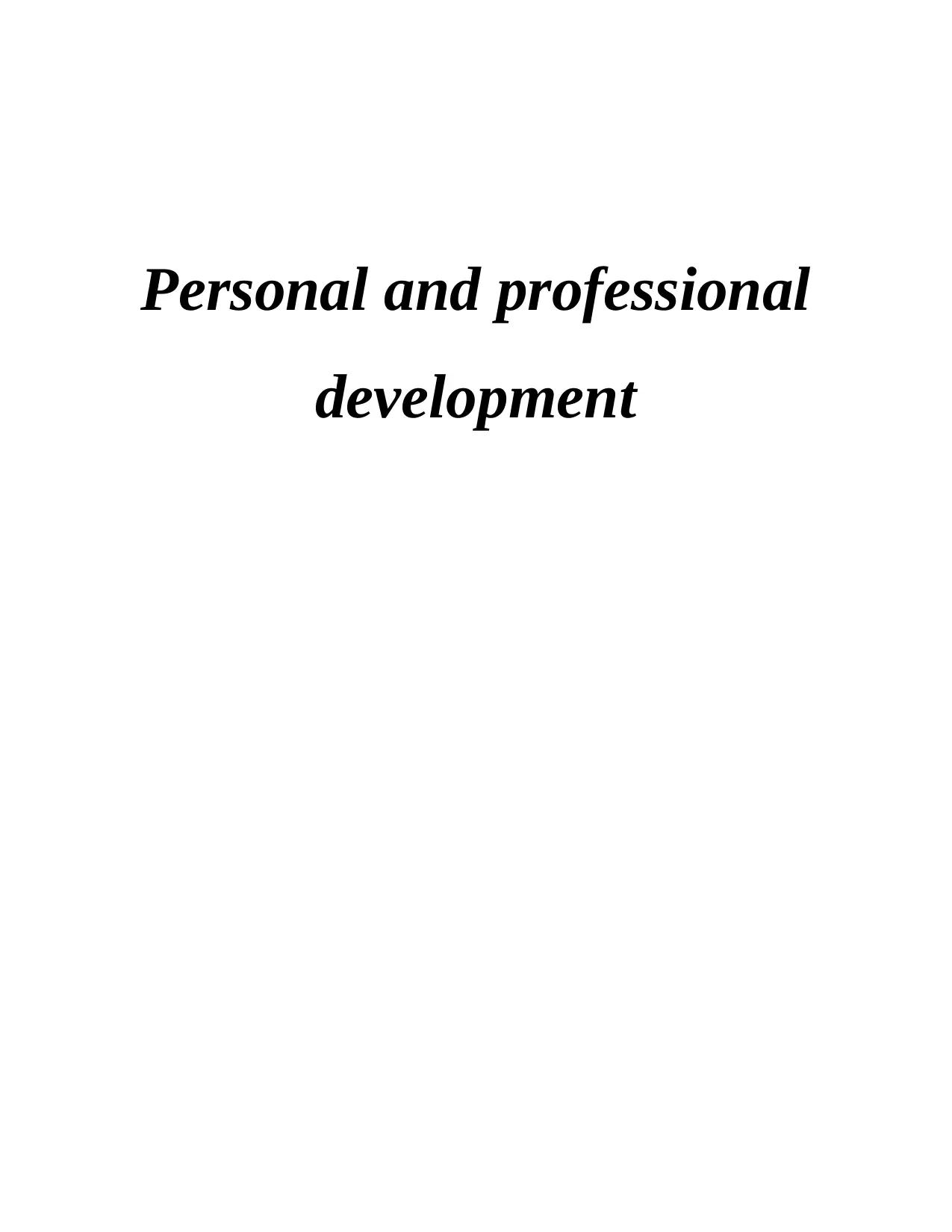
Personal and professional
development
development
Paraphrase This Document
Need a fresh take? Get an instant paraphrase of this document with our AI Paraphraser
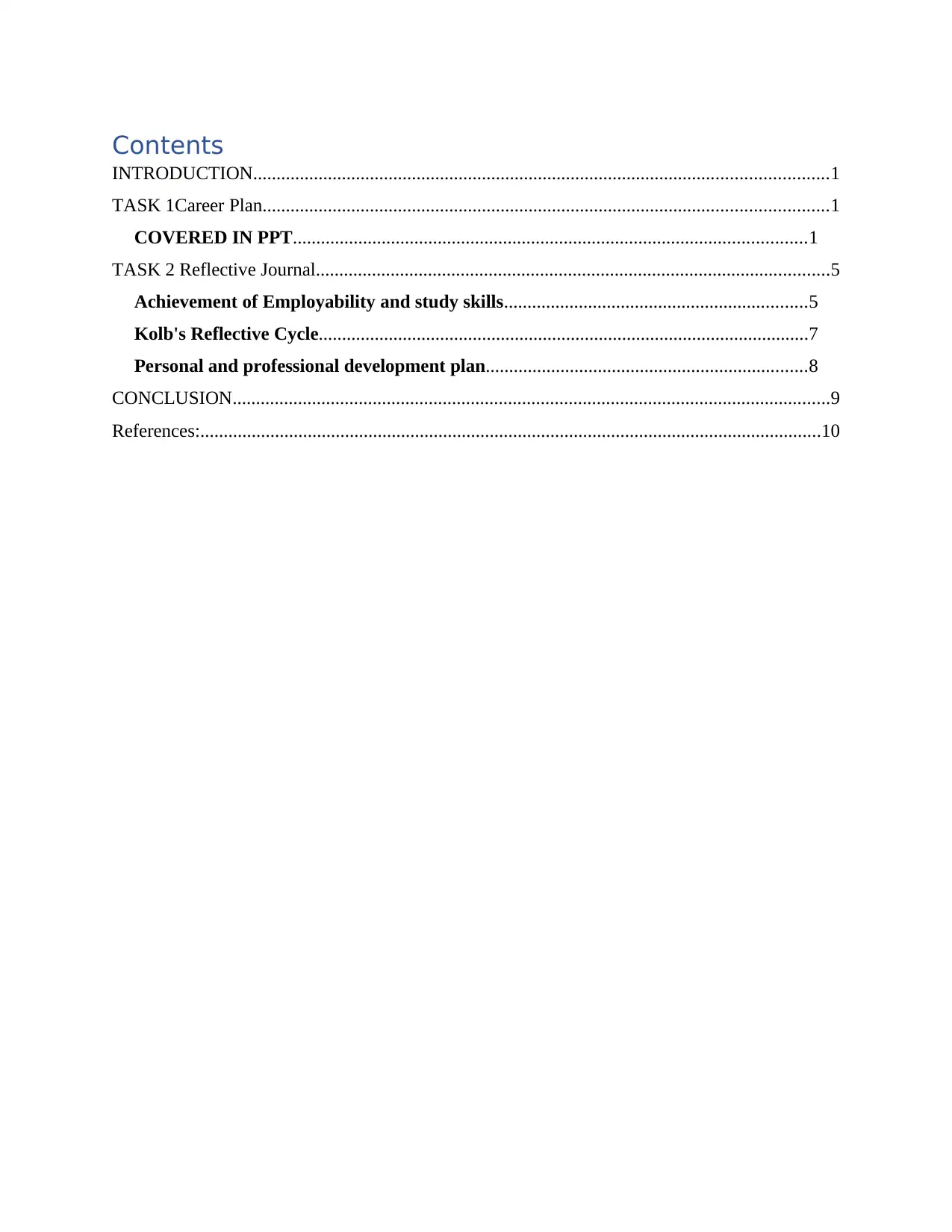
Contents
INTRODUCTION...........................................................................................................................1
TASK 1Career Plan.........................................................................................................................1
COVERED IN PPT..............................................................................................................1
TASK 2 Reflective Journal..............................................................................................................5
Achievement of Employability and study skills.................................................................5
Kolb's Reflective Cycle.........................................................................................................7
Personal and professional development plan.....................................................................8
CONCLUSION................................................................................................................................9
References:.....................................................................................................................................10
INTRODUCTION...........................................................................................................................1
TASK 1Career Plan.........................................................................................................................1
COVERED IN PPT..............................................................................................................1
TASK 2 Reflective Journal..............................................................................................................5
Achievement of Employability and study skills.................................................................5
Kolb's Reflective Cycle.........................................................................................................7
Personal and professional development plan.....................................................................8
CONCLUSION................................................................................................................................9
References:.....................................................................................................................................10
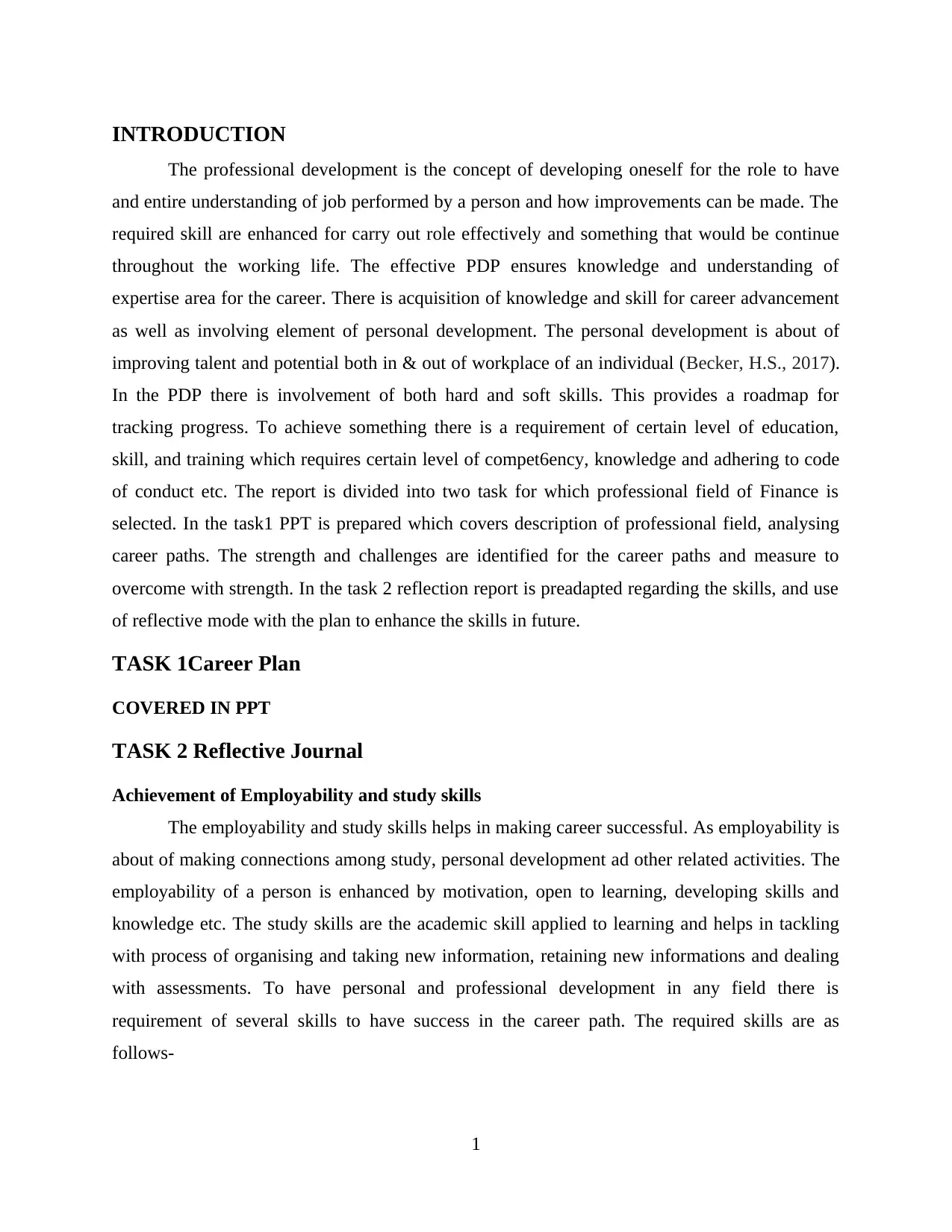
INTRODUCTION
The professional development is the concept of developing oneself for the role to have
and entire understanding of job performed by a person and how improvements can be made. The
required skill are enhanced for carry out role effectively and something that would be continue
throughout the working life. The effective PDP ensures knowledge and understanding of
expertise area for the career. There is acquisition of knowledge and skill for career advancement
as well as involving element of personal development. The personal development is about of
improving talent and potential both in & out of workplace of an individual (Becker, H.S., 2017).
In the PDP there is involvement of both hard and soft skills. This provides a roadmap for
tracking progress. To achieve something there is a requirement of certain level of education,
skill, and training which requires certain level of compet6ency, knowledge and adhering to code
of conduct etc. The report is divided into two task for which professional field of Finance is
selected. In the task1 PPT is prepared which covers description of professional field, analysing
career paths. The strength and challenges are identified for the career paths and measure to
overcome with strength. In the task 2 reflection report is preadapted regarding the skills, and use
of reflective mode with the plan to enhance the skills in future.
TASK 1Career Plan
COVERED IN PPT
TASK 2 Reflective Journal
Achievement of Employability and study skills
The employability and study skills helps in making career successful. As employability is
about of making connections among study, personal development ad other related activities. The
employability of a person is enhanced by motivation, open to learning, developing skills and
knowledge etc. The study skills are the academic skill applied to learning and helps in tackling
with process of organising and taking new information, retaining new informations and dealing
with assessments. To have personal and professional development in any field there is
requirement of several skills to have success in the career path. The required skills are as
follows-
1
The professional development is the concept of developing oneself for the role to have
and entire understanding of job performed by a person and how improvements can be made. The
required skill are enhanced for carry out role effectively and something that would be continue
throughout the working life. The effective PDP ensures knowledge and understanding of
expertise area for the career. There is acquisition of knowledge and skill for career advancement
as well as involving element of personal development. The personal development is about of
improving talent and potential both in & out of workplace of an individual (Becker, H.S., 2017).
In the PDP there is involvement of both hard and soft skills. This provides a roadmap for
tracking progress. To achieve something there is a requirement of certain level of education,
skill, and training which requires certain level of compet6ency, knowledge and adhering to code
of conduct etc. The report is divided into two task for which professional field of Finance is
selected. In the task1 PPT is prepared which covers description of professional field, analysing
career paths. The strength and challenges are identified for the career paths and measure to
overcome with strength. In the task 2 reflection report is preadapted regarding the skills, and use
of reflective mode with the plan to enhance the skills in future.
TASK 1Career Plan
COVERED IN PPT
TASK 2 Reflective Journal
Achievement of Employability and study skills
The employability and study skills helps in making career successful. As employability is
about of making connections among study, personal development ad other related activities. The
employability of a person is enhanced by motivation, open to learning, developing skills and
knowledge etc. The study skills are the academic skill applied to learning and helps in tackling
with process of organising and taking new information, retaining new informations and dealing
with assessments. To have personal and professional development in any field there is
requirement of several skills to have success in the career path. The required skills are as
follows-
1
⊘ This is a preview!⊘
Do you want full access?
Subscribe today to unlock all pages.

Trusted by 1+ million students worldwide
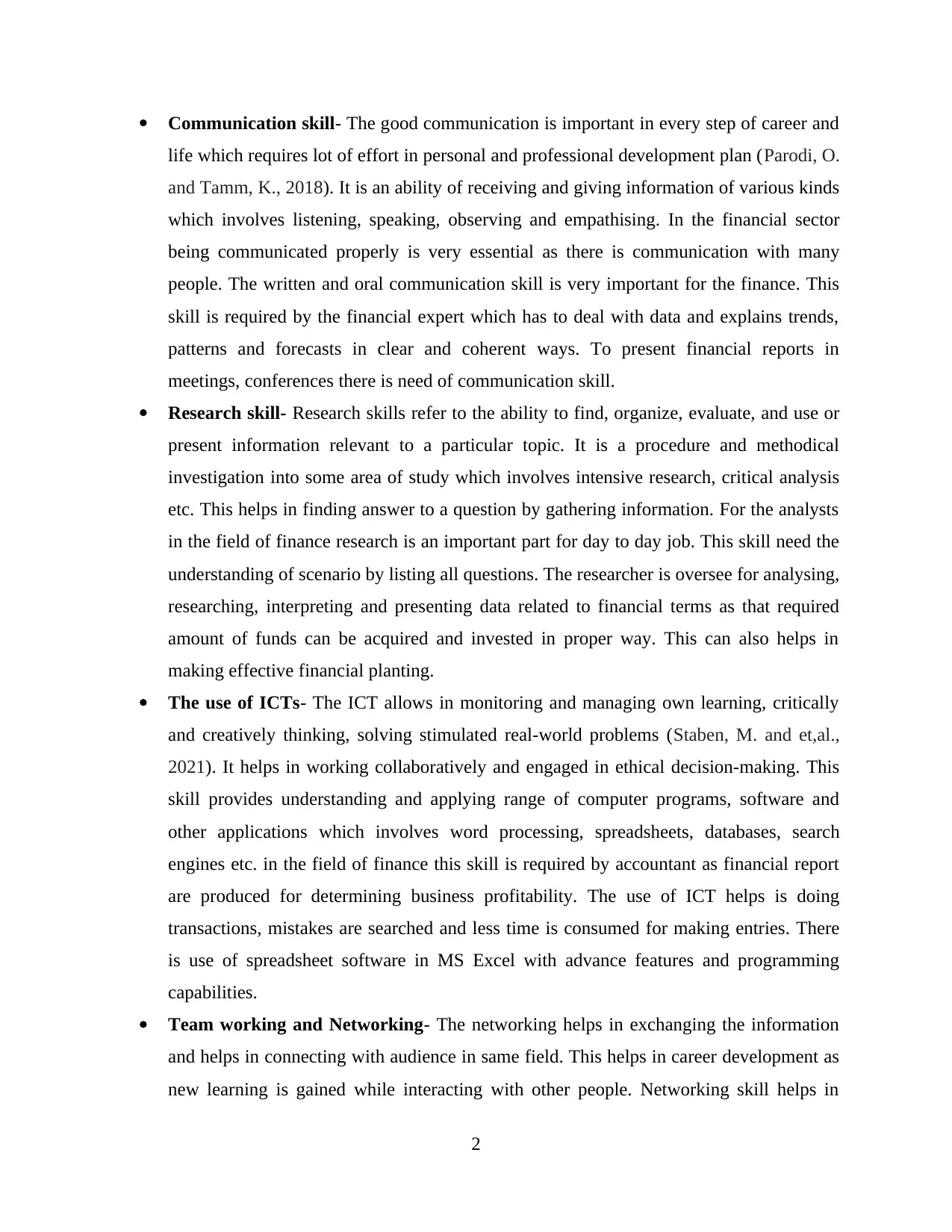
Communication skill- The good communication is important in every step of career and
life which requires lot of effort in personal and professional development plan (Parodi, O.
and Tamm, K., 2018). It is an ability of receiving and giving information of various kinds
which involves listening, speaking, observing and empathising. In the financial sector
being communicated properly is very essential as there is communication with many
people. The written and oral communication skill is very important for the finance. This
skill is required by the financial expert which has to deal with data and explains trends,
patterns and forecasts in clear and coherent ways. To present financial reports in
meetings, conferences there is need of communication skill.
Research skill- Research skills refer to the ability to find, organize, evaluate, and use or
present information relevant to a particular topic. It is a procedure and methodical
investigation into some area of study which involves intensive research, critical analysis
etc. This helps in finding answer to a question by gathering information. For the analysts
in the field of finance research is an important part for day to day job. This skill need the
understanding of scenario by listing all questions. The researcher is oversee for analysing,
researching, interpreting and presenting data related to financial terms as that required
amount of funds can be acquired and invested in proper way. This can also helps in
making effective financial planting.
The use of ICTs- The ICT allows in monitoring and managing own learning, critically
and creatively thinking, solving stimulated real-world problems (Staben, M. and et,al.,
2021). It helps in working collaboratively and engaged in ethical decision-making. This
skill provides understanding and applying range of computer programs, software and
other applications which involves word processing, spreadsheets, databases, search
engines etc. in the field of finance this skill is required by accountant as financial report
are produced for determining business profitability. The use of ICT helps is doing
transactions, mistakes are searched and less time is consumed for making entries. There
is use of spreadsheet software in MS Excel with advance features and programming
capabilities.
Team working and Networking- The networking helps in exchanging the information
and helps in connecting with audience in same field. This helps in career development as
new learning is gained while interacting with other people. Networking skill helps in
2
life which requires lot of effort in personal and professional development plan (Parodi, O.
and Tamm, K., 2018). It is an ability of receiving and giving information of various kinds
which involves listening, speaking, observing and empathising. In the financial sector
being communicated properly is very essential as there is communication with many
people. The written and oral communication skill is very important for the finance. This
skill is required by the financial expert which has to deal with data and explains trends,
patterns and forecasts in clear and coherent ways. To present financial reports in
meetings, conferences there is need of communication skill.
Research skill- Research skills refer to the ability to find, organize, evaluate, and use or
present information relevant to a particular topic. It is a procedure and methodical
investigation into some area of study which involves intensive research, critical analysis
etc. This helps in finding answer to a question by gathering information. For the analysts
in the field of finance research is an important part for day to day job. This skill need the
understanding of scenario by listing all questions. The researcher is oversee for analysing,
researching, interpreting and presenting data related to financial terms as that required
amount of funds can be acquired and invested in proper way. This can also helps in
making effective financial planting.
The use of ICTs- The ICT allows in monitoring and managing own learning, critically
and creatively thinking, solving stimulated real-world problems (Staben, M. and et,al.,
2021). It helps in working collaboratively and engaged in ethical decision-making. This
skill provides understanding and applying range of computer programs, software and
other applications which involves word processing, spreadsheets, databases, search
engines etc. in the field of finance this skill is required by accountant as financial report
are produced for determining business profitability. The use of ICT helps is doing
transactions, mistakes are searched and less time is consumed for making entries. There
is use of spreadsheet software in MS Excel with advance features and programming
capabilities.
Team working and Networking- The networking helps in exchanging the information
and helps in connecting with audience in same field. This helps in career development as
new learning is gained while interacting with other people. Networking skill helps in
2
Paraphrase This Document
Need a fresh take? Get an instant paraphrase of this document with our AI Paraphraser
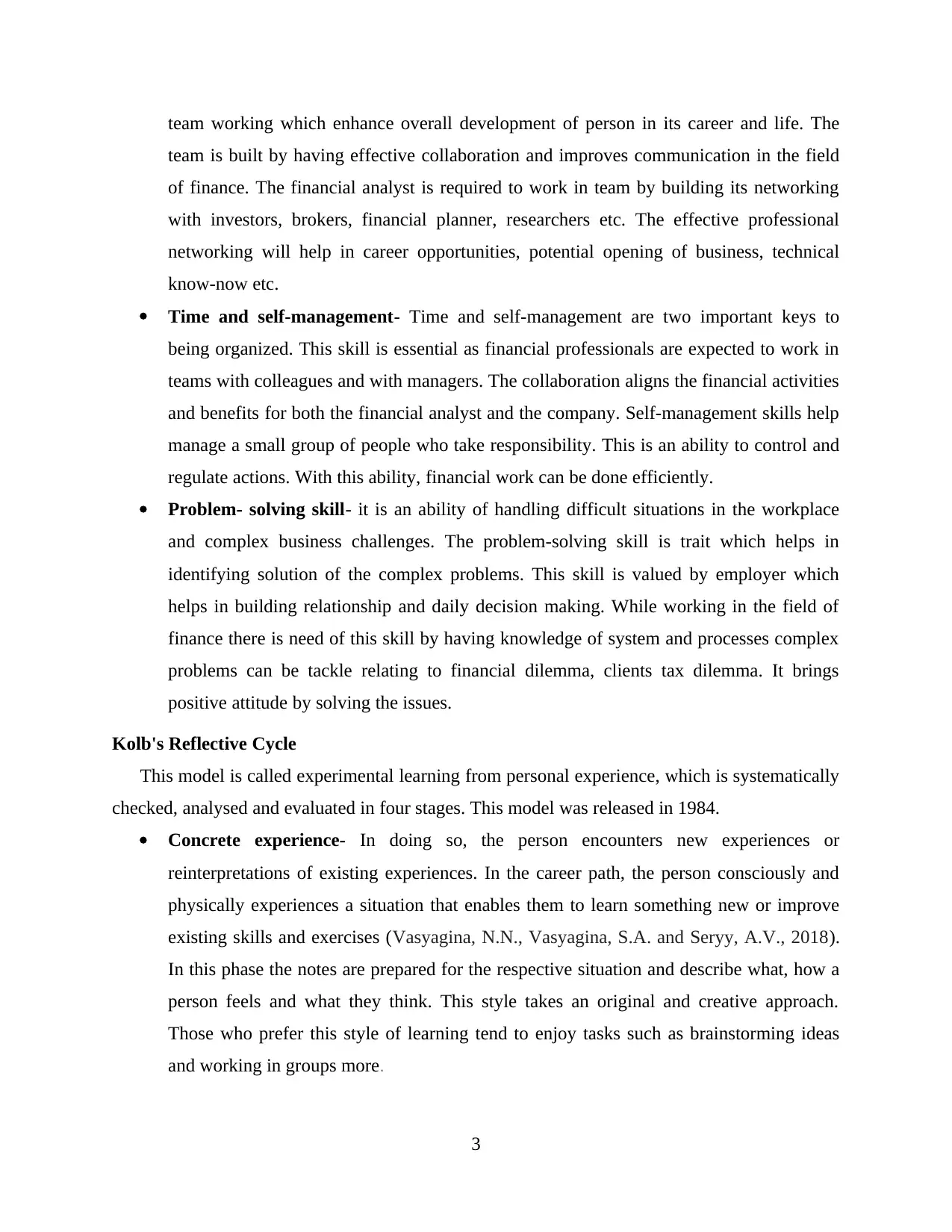
team working which enhance overall development of person in its career and life. The
team is built by having effective collaboration and improves communication in the field
of finance. The financial analyst is required to work in team by building its networking
with investors, brokers, financial planner, researchers etc. The effective professional
networking will help in career opportunities, potential opening of business, technical
know-now etc.
Time and self-management- Time and self-management are two important keys to
being organized. This skill is essential as financial professionals are expected to work in
teams with colleagues and with managers. The collaboration aligns the financial activities
and benefits for both the financial analyst and the company. Self-management skills help
manage a small group of people who take responsibility. This is an ability to control and
regulate actions. With this ability, financial work can be done efficiently.
Problem- solving skill- it is an ability of handling difficult situations in the workplace
and complex business challenges. The problem-solving skill is trait which helps in
identifying solution of the complex problems. This skill is valued by employer which
helps in building relationship and daily decision making. While working in the field of
finance there is need of this skill by having knowledge of system and processes complex
problems can be tackle relating to financial dilemma, clients tax dilemma. It brings
positive attitude by solving the issues.
Kolb's Reflective Cycle
This model is called experimental learning from personal experience, which is systematically
checked, analysed and evaluated in four stages. This model was released in 1984.
Concrete experience- In doing so, the person encounters new experiences or
reinterpretations of existing experiences. In the career path, the person consciously and
physically experiences a situation that enables them to learn something new or improve
existing skills and exercises (Vasyagina, N.N., Vasyagina, S.A. and Seryy, A.V., 2018).
In this phase the notes are prepared for the respective situation and describe what, how a
person feels and what they think. This style takes an original and creative approach.
Those who prefer this style of learning tend to enjoy tasks such as brainstorming ideas
and working in groups more.
3
team is built by having effective collaboration and improves communication in the field
of finance. The financial analyst is required to work in team by building its networking
with investors, brokers, financial planner, researchers etc. The effective professional
networking will help in career opportunities, potential opening of business, technical
know-now etc.
Time and self-management- Time and self-management are two important keys to
being organized. This skill is essential as financial professionals are expected to work in
teams with colleagues and with managers. The collaboration aligns the financial activities
and benefits for both the financial analyst and the company. Self-management skills help
manage a small group of people who take responsibility. This is an ability to control and
regulate actions. With this ability, financial work can be done efficiently.
Problem- solving skill- it is an ability of handling difficult situations in the workplace
and complex business challenges. The problem-solving skill is trait which helps in
identifying solution of the complex problems. This skill is valued by employer which
helps in building relationship and daily decision making. While working in the field of
finance there is need of this skill by having knowledge of system and processes complex
problems can be tackle relating to financial dilemma, clients tax dilemma. It brings
positive attitude by solving the issues.
Kolb's Reflective Cycle
This model is called experimental learning from personal experience, which is systematically
checked, analysed and evaluated in four stages. This model was released in 1984.
Concrete experience- In doing so, the person encounters new experiences or
reinterpretations of existing experiences. In the career path, the person consciously and
physically experiences a situation that enables them to learn something new or improve
existing skills and exercises (Vasyagina, N.N., Vasyagina, S.A. and Seryy, A.V., 2018).
In this phase the notes are prepared for the respective situation and describe what, how a
person feels and what they think. This style takes an original and creative approach.
Those who prefer this style of learning tend to enjoy tasks such as brainstorming ideas
and working in groups more.
3
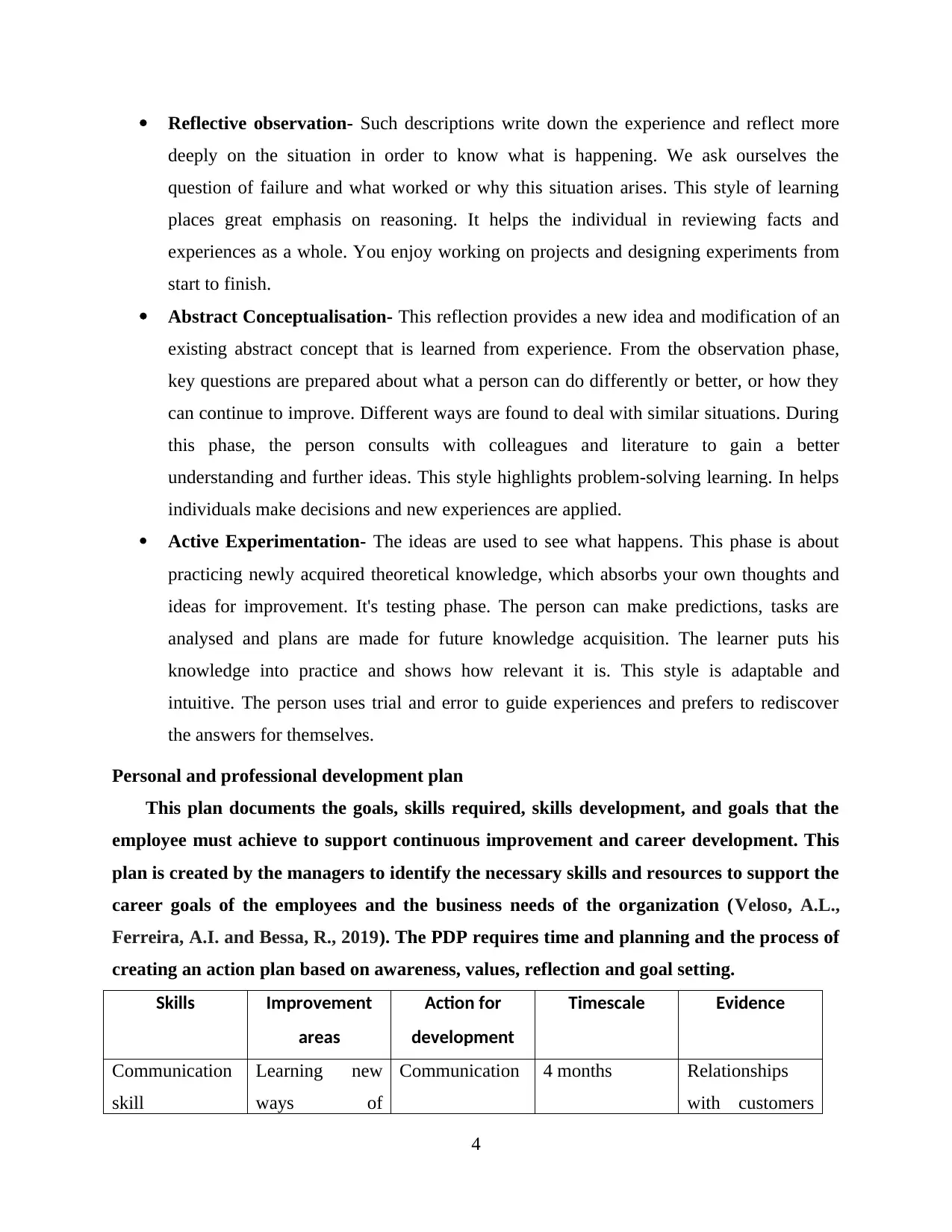
Reflective observation- Such descriptions write down the experience and reflect more
deeply on the situation in order to know what is happening. We ask ourselves the
question of failure and what worked or why this situation arises. This style of learning
places great emphasis on reasoning. It helps the individual in reviewing facts and
experiences as a whole. You enjoy working on projects and designing experiments from
start to finish.
Abstract Conceptualisation- This reflection provides a new idea and modification of an
existing abstract concept that is learned from experience. From the observation phase,
key questions are prepared about what a person can do differently or better, or how they
can continue to improve. Different ways are found to deal with similar situations. During
this phase, the person consults with colleagues and literature to gain a better
understanding and further ideas. This style highlights problem-solving learning. In helps
individuals make decisions and new experiences are applied.
Active Experimentation- The ideas are used to see what happens. This phase is about
practicing newly acquired theoretical knowledge, which absorbs your own thoughts and
ideas for improvement. It's testing phase. The person can make predictions, tasks are
analysed and plans are made for future knowledge acquisition. The learner puts his
knowledge into practice and shows how relevant it is. This style is adaptable and
intuitive. The person uses trial and error to guide experiences and prefers to rediscover
the answers for themselves.
Personal and professional development plan
This plan documents the goals, skills required, skills development, and goals that the
employee must achieve to support continuous improvement and career development. This
plan is created by the managers to identify the necessary skills and resources to support the
career goals of the employees and the business needs of the organization (Veloso, A.L.,
Ferreira, A.I. and Bessa, R., 2019). The PDP requires time and planning and the process of
creating an action plan based on awareness, values, reflection and goal setting.
Skills Improvement
areas
Action for
development
Timescale Evidence
Communication
skill
Learning new
ways of
Communication 4 months Relationships
with customers
4
deeply on the situation in order to know what is happening. We ask ourselves the
question of failure and what worked or why this situation arises. This style of learning
places great emphasis on reasoning. It helps the individual in reviewing facts and
experiences as a whole. You enjoy working on projects and designing experiments from
start to finish.
Abstract Conceptualisation- This reflection provides a new idea and modification of an
existing abstract concept that is learned from experience. From the observation phase,
key questions are prepared about what a person can do differently or better, or how they
can continue to improve. Different ways are found to deal with similar situations. During
this phase, the person consults with colleagues and literature to gain a better
understanding and further ideas. This style highlights problem-solving learning. In helps
individuals make decisions and new experiences are applied.
Active Experimentation- The ideas are used to see what happens. This phase is about
practicing newly acquired theoretical knowledge, which absorbs your own thoughts and
ideas for improvement. It's testing phase. The person can make predictions, tasks are
analysed and plans are made for future knowledge acquisition. The learner puts his
knowledge into practice and shows how relevant it is. This style is adaptable and
intuitive. The person uses trial and error to guide experiences and prefers to rediscover
the answers for themselves.
Personal and professional development plan
This plan documents the goals, skills required, skills development, and goals that the
employee must achieve to support continuous improvement and career development. This
plan is created by the managers to identify the necessary skills and resources to support the
career goals of the employees and the business needs of the organization (Veloso, A.L.,
Ferreira, A.I. and Bessa, R., 2019). The PDP requires time and planning and the process of
creating an action plan based on awareness, values, reflection and goal setting.
Skills Improvement
areas
Action for
development
Timescale Evidence
Communication
skill
Learning new
ways of
Communication 4 months Relationships
with customers
4
⊘ This is a preview!⊘
Do you want full access?
Subscribe today to unlock all pages.

Trusted by 1+ million students worldwide
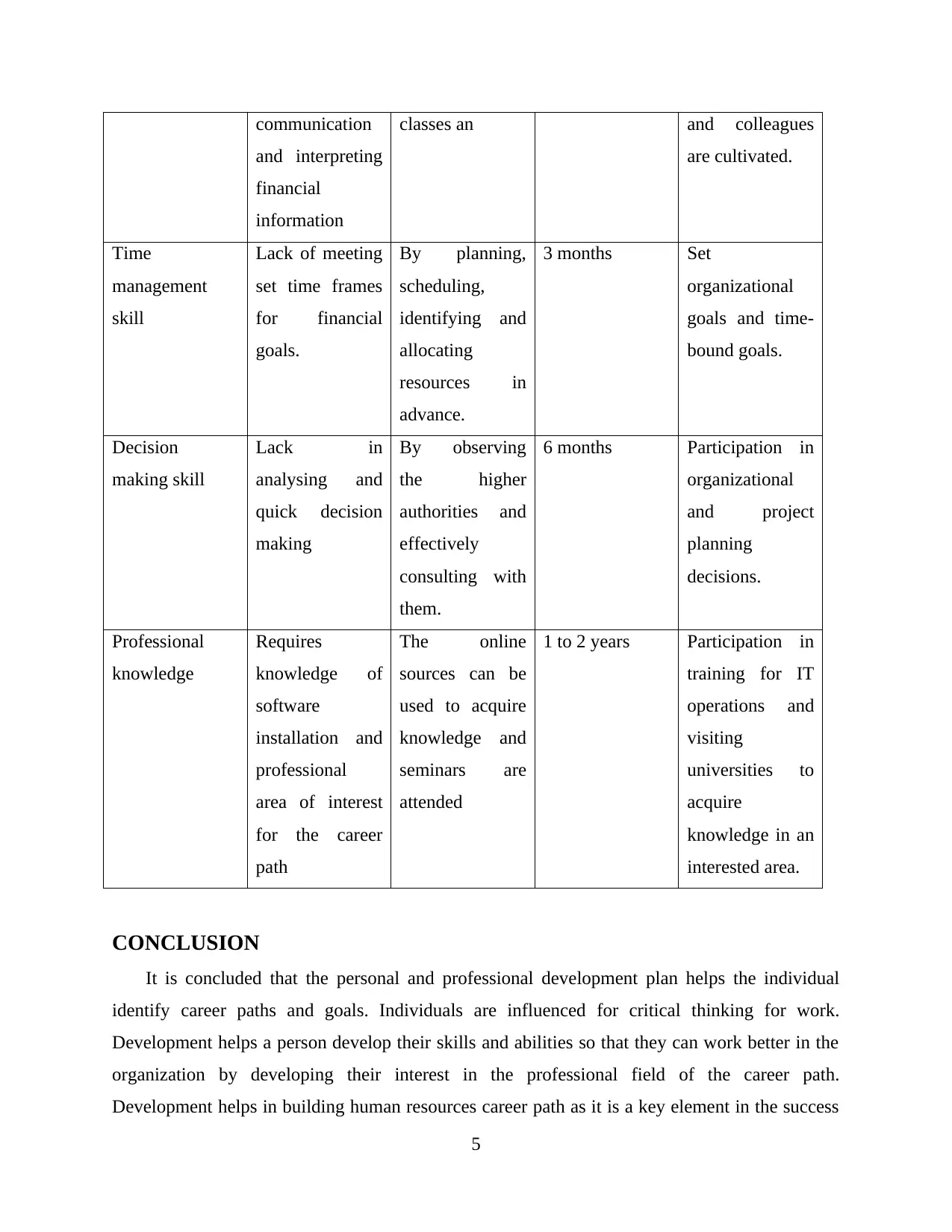
communication
and interpreting
financial
information
classes an and colleagues
are cultivated.
Time
management
skill
Lack of meeting
set time frames
for financial
goals.
By planning,
scheduling,
identifying and
allocating
resources in
advance.
3 months Set
organizational
goals and time-
bound goals.
Decision
making skill
Lack in
analysing and
quick decision
making
By observing
the higher
authorities and
effectively
consulting with
them.
6 months Participation in
organizational
and project
planning
decisions.
Professional
knowledge
Requires
knowledge of
software
installation and
professional
area of interest
for the career
path
The online
sources can be
used to acquire
knowledge and
seminars are
attended
1 to 2 years Participation in
training for IT
operations and
visiting
universities to
acquire
knowledge in an
interested area.
CONCLUSION
It is concluded that the personal and professional development plan helps the individual
identify career paths and goals. Individuals are influenced for critical thinking for work.
Development helps a person develop their skills and abilities so that they can work better in the
organization by developing their interest in the professional field of the career path.
Development helps in building human resources career path as it is a key element in the success
5
and interpreting
financial
information
classes an and colleagues
are cultivated.
Time
management
skill
Lack of meeting
set time frames
for financial
goals.
By planning,
scheduling,
identifying and
allocating
resources in
advance.
3 months Set
organizational
goals and time-
bound goals.
Decision
making skill
Lack in
analysing and
quick decision
making
By observing
the higher
authorities and
effectively
consulting with
them.
6 months Participation in
organizational
and project
planning
decisions.
Professional
knowledge
Requires
knowledge of
software
installation and
professional
area of interest
for the career
path
The online
sources can be
used to acquire
knowledge and
seminars are
attended
1 to 2 years Participation in
training for IT
operations and
visiting
universities to
acquire
knowledge in an
interested area.
CONCLUSION
It is concluded that the personal and professional development plan helps the individual
identify career paths and goals. Individuals are influenced for critical thinking for work.
Development helps a person develop their skills and abilities so that they can work better in the
organization by developing their interest in the professional field of the career path.
Development helps in building human resources career path as it is a key element in the success
5
Paraphrase This Document
Need a fresh take? Get an instant paraphrase of this document with our AI Paraphraser
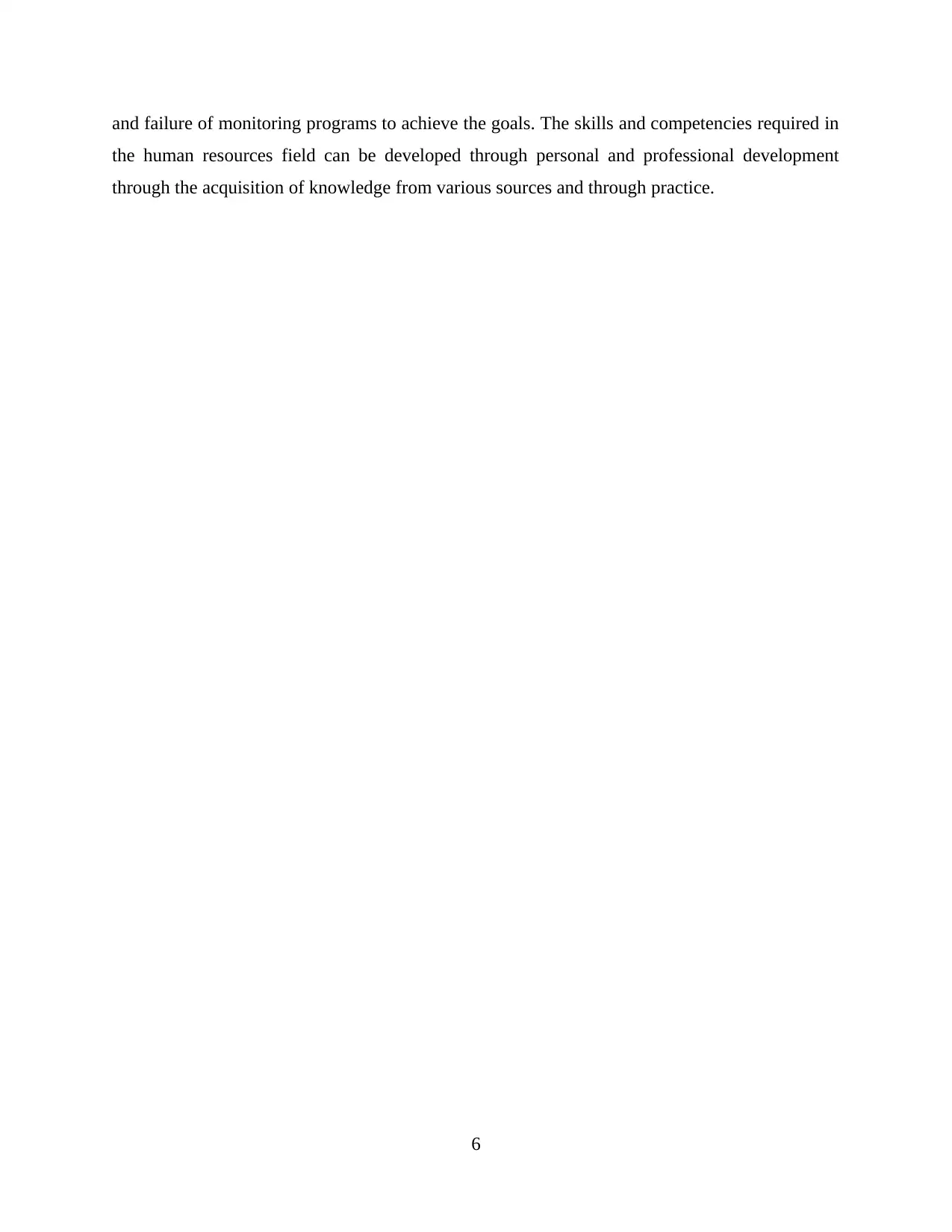
and failure of monitoring programs to achieve the goals. The skills and competencies required in
the human resources field can be developed through personal and professional development
through the acquisition of knowledge from various sources and through practice.
6
the human resources field can be developed through personal and professional development
through the acquisition of knowledge from various sources and through practice.
6
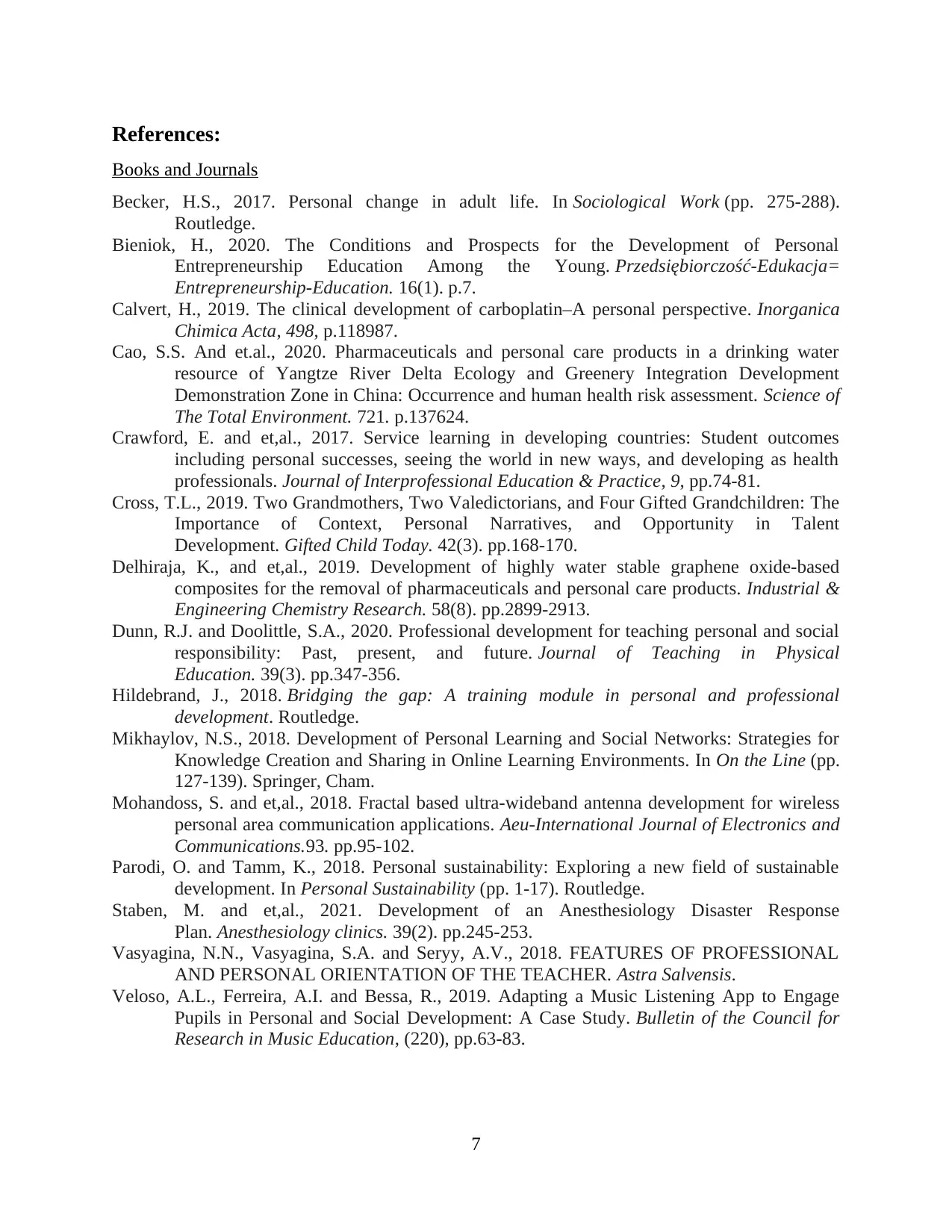
References:
Books and Journals
Becker, H.S., 2017. Personal change in adult life. In Sociological Work (pp. 275-288).
Routledge.
Bieniok, H., 2020. The Conditions and Prospects for the Development of Personal
Entrepreneurship Education Among the Young. Przedsiębiorczość-Edukacja=
Entrepreneurship-Education. 16(1). p.7.
Calvert, H., 2019. The clinical development of carboplatin–A personal perspective. Inorganica
Chimica Acta, 498, p.118987.
Cao, S.S. And et.al., 2020. Pharmaceuticals and personal care products in a drinking water
resource of Yangtze River Delta Ecology and Greenery Integration Development
Demonstration Zone in China: Occurrence and human health risk assessment. Science of
The Total Environment. 721. p.137624.
Crawford, E. and et,al., 2017. Service learning in developing countries: Student outcomes
including personal successes, seeing the world in new ways, and developing as health
professionals. Journal of Interprofessional Education & Practice, 9, pp.74-81.
Cross, T.L., 2019. Two Grandmothers, Two Valedictorians, and Four Gifted Grandchildren: The
Importance of Context, Personal Narratives, and Opportunity in Talent
Development. Gifted Child Today. 42(3). pp.168-170.
Delhiraja, K., and et,al., 2019. Development of highly water stable graphene oxide-based
composites for the removal of pharmaceuticals and personal care products. Industrial &
Engineering Chemistry Research. 58(8). pp.2899-2913.
Dunn, R.J. and Doolittle, S.A., 2020. Professional development for teaching personal and social
responsibility: Past, present, and future. Journal of Teaching in Physical
Education. 39(3). pp.347-356.
Hildebrand, J., 2018. Bridging the gap: A training module in personal and professional
development. Routledge.
Mikhaylov, N.S., 2018. Development of Personal Learning and Social Networks: Strategies for
Knowledge Creation and Sharing in Online Learning Environments. In On the Line (pp.
127-139). Springer, Cham.
Mohandoss, S. and et,al., 2018. Fractal based ultra-wideband antenna development for wireless
personal area communication applications. Aeu-International Journal of Electronics and
Communications.93. pp.95-102.
Parodi, O. and Tamm, K., 2018. Personal sustainability: Exploring a new field of sustainable
development. In Personal Sustainability (pp. 1-17). Routledge.
Staben, M. and et,al., 2021. Development of an Anesthesiology Disaster Response
Plan. Anesthesiology clinics. 39(2). pp.245-253.
Vasyagina, N.N., Vasyagina, S.A. and Seryy, A.V., 2018. FEATURES OF PROFESSIONAL
AND PERSONAL ORIENTATION OF THE TEACHER. Astra Salvensis.
Veloso, A.L., Ferreira, A.I. and Bessa, R., 2019. Adapting a Music Listening App to Engage
Pupils in Personal and Social Development: A Case Study. Bulletin of the Council for
Research in Music Education, (220), pp.63-83.
7
Books and Journals
Becker, H.S., 2017. Personal change in adult life. In Sociological Work (pp. 275-288).
Routledge.
Bieniok, H., 2020. The Conditions and Prospects for the Development of Personal
Entrepreneurship Education Among the Young. Przedsiębiorczość-Edukacja=
Entrepreneurship-Education. 16(1). p.7.
Calvert, H., 2019. The clinical development of carboplatin–A personal perspective. Inorganica
Chimica Acta, 498, p.118987.
Cao, S.S. And et.al., 2020. Pharmaceuticals and personal care products in a drinking water
resource of Yangtze River Delta Ecology and Greenery Integration Development
Demonstration Zone in China: Occurrence and human health risk assessment. Science of
The Total Environment. 721. p.137624.
Crawford, E. and et,al., 2017. Service learning in developing countries: Student outcomes
including personal successes, seeing the world in new ways, and developing as health
professionals. Journal of Interprofessional Education & Practice, 9, pp.74-81.
Cross, T.L., 2019. Two Grandmothers, Two Valedictorians, and Four Gifted Grandchildren: The
Importance of Context, Personal Narratives, and Opportunity in Talent
Development. Gifted Child Today. 42(3). pp.168-170.
Delhiraja, K., and et,al., 2019. Development of highly water stable graphene oxide-based
composites for the removal of pharmaceuticals and personal care products. Industrial &
Engineering Chemistry Research. 58(8). pp.2899-2913.
Dunn, R.J. and Doolittle, S.A., 2020. Professional development for teaching personal and social
responsibility: Past, present, and future. Journal of Teaching in Physical
Education. 39(3). pp.347-356.
Hildebrand, J., 2018. Bridging the gap: A training module in personal and professional
development. Routledge.
Mikhaylov, N.S., 2018. Development of Personal Learning and Social Networks: Strategies for
Knowledge Creation and Sharing in Online Learning Environments. In On the Line (pp.
127-139). Springer, Cham.
Mohandoss, S. and et,al., 2018. Fractal based ultra-wideband antenna development for wireless
personal area communication applications. Aeu-International Journal of Electronics and
Communications.93. pp.95-102.
Parodi, O. and Tamm, K., 2018. Personal sustainability: Exploring a new field of sustainable
development. In Personal Sustainability (pp. 1-17). Routledge.
Staben, M. and et,al., 2021. Development of an Anesthesiology Disaster Response
Plan. Anesthesiology clinics. 39(2). pp.245-253.
Vasyagina, N.N., Vasyagina, S.A. and Seryy, A.V., 2018. FEATURES OF PROFESSIONAL
AND PERSONAL ORIENTATION OF THE TEACHER. Astra Salvensis.
Veloso, A.L., Ferreira, A.I. and Bessa, R., 2019. Adapting a Music Listening App to Engage
Pupils in Personal and Social Development: A Case Study. Bulletin of the Council for
Research in Music Education, (220), pp.63-83.
7
⊘ This is a preview!⊘
Do you want full access?
Subscribe today to unlock all pages.

Trusted by 1+ million students worldwide
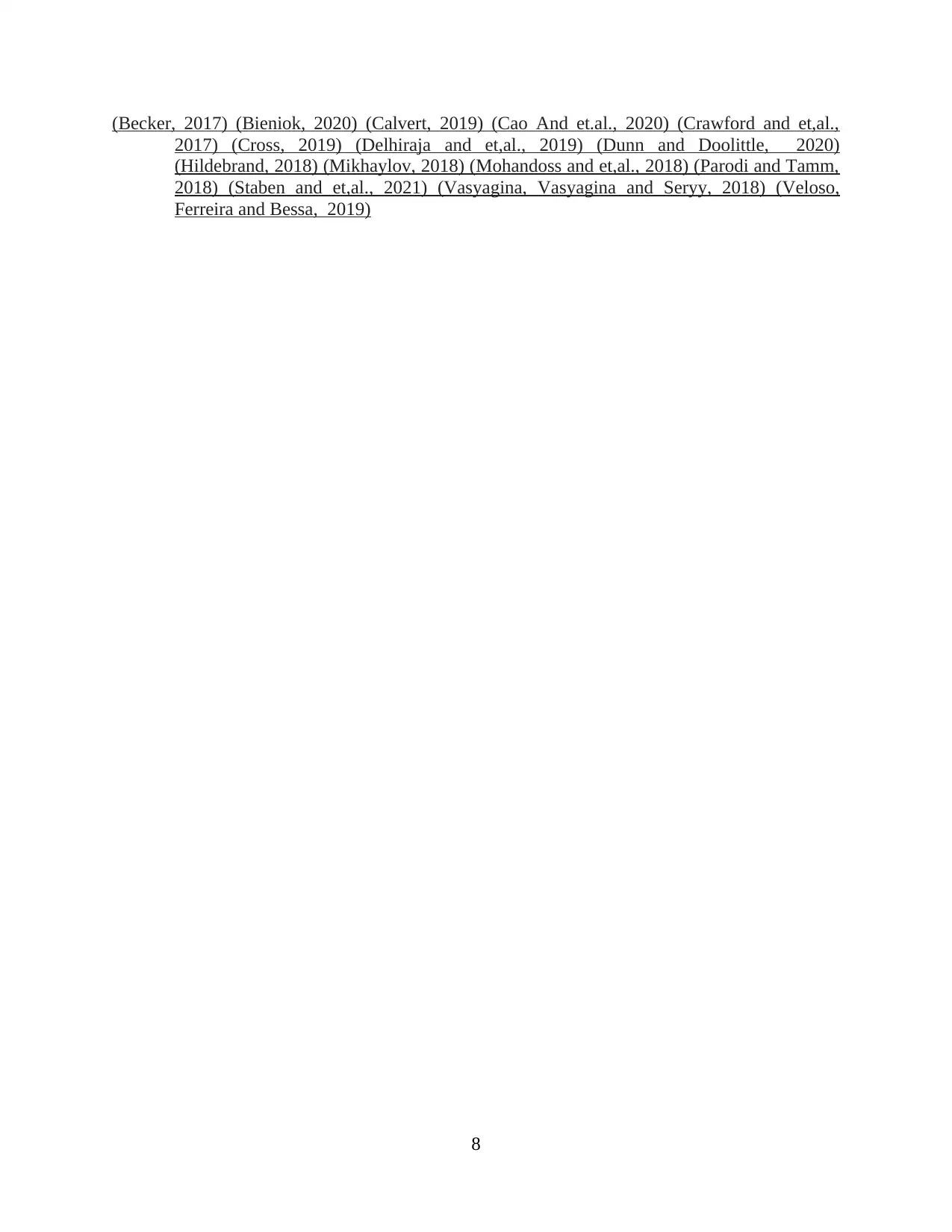
(Becker, 2017) (Bieniok, 2020) (Calvert, 2019) (Cao And et.al., 2020) (Crawford and et,al.,
2017) (Cross, 2019) (Delhiraja and et,al., 2019) (Dunn and Doolittle, 2020)
(Hildebrand, 2018) (Mikhaylov, 2018) (Mohandoss and et,al., 2018) (Parodi and Tamm,
2018) (Staben and et,al., 2021) (Vasyagina, Vasyagina and Seryy, 2018) (Veloso,
Ferreira and Bessa, 2019)
8
2017) (Cross, 2019) (Delhiraja and et,al., 2019) (Dunn and Doolittle, 2020)
(Hildebrand, 2018) (Mikhaylov, 2018) (Mohandoss and et,al., 2018) (Parodi and Tamm,
2018) (Staben and et,al., 2021) (Vasyagina, Vasyagina and Seryy, 2018) (Veloso,
Ferreira and Bessa, 2019)
8
1 out of 10
Related Documents
Your All-in-One AI-Powered Toolkit for Academic Success.
+13062052269
info@desklib.com
Available 24*7 on WhatsApp / Email
![[object Object]](/_next/static/media/star-bottom.7253800d.svg)
Unlock your academic potential
Copyright © 2020–2026 A2Z Services. All Rights Reserved. Developed and managed by ZUCOL.




